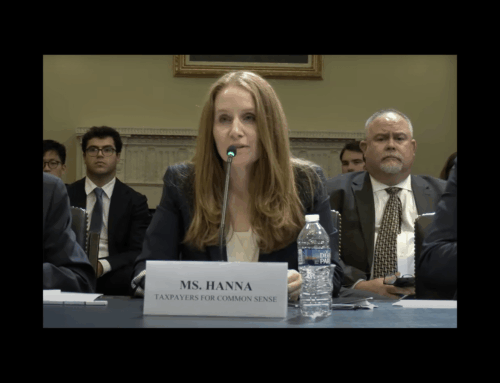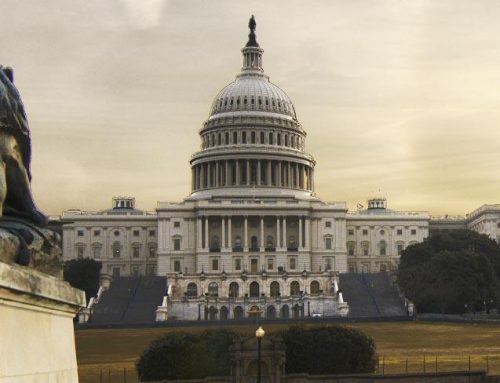This episode of Budget Watchdog All Federal dives into the National Defense Authorization Act for fiscal year 2026, examining critical taxpayer protection measures at stake. Host Steve Ellis and policy analyst Gabe Murphy discuss the Pentagon’s proposed budget increases, controversial acquisition reform proposals like the FORGED and SPEED Acts, and key amendments, including Pentagon audit accountability measures and right-to-repair provisions. They also cover unfunded priority lists, the costly Golden Dome missile defense program, and recent developments in defense spending that could impact taxpayers for years to come.
Transcript
Announcer (00:02):
Welcome to Budget Watchdog All Federal, the podcast dedicated to making sense of the budget spending and tax issues facing the nation. Cut through the partisan rhetoric and talking points for the facts about what’s being talked about, bandied about and pushed to Washington, brought to you by Taxpayers for Common Sense. And now the host of Budget Watchdog AF TCS President Steve Ellis.
Steve Ellis (00:39):
Welcome to All American Taxpayers Seeking Common Sense. You’ve made it to the right place for 30 years. TCS that’s Taxpayers for Common Sense, has served as an independent nonpartisan budget watchdog group based in Washington DC We believe in fiscal policy for America that is based on facts. We believe in transparency and accountability because no matter where you are in the political spectrum, no one wants to see their tax dollars wasted. It’s September, 2025 and Dear podcast listeners, as Congress takes up the National Defense Authorization Act for fiscal year 2026, the Pentagon’s annual must Pass policy bill. There are some critical taxpayer protection measures on the table that deserve your attention. From Pentagon Audit Accountability to reigning in wasteful Unfunded Priorities Lists, TCS has been pushing for amendments that would save taxpayers billions while strengthening our national security. Here to break down what’s at stake is TCS policy analyst Gabe Murphy, who’s been tracking these issues closely and working diligently on behalf of taxpayers in Congress. Gabe, welcome back to the show.
Gabe Murphy (01:42):
Great to be here, Steve.
Steve Ellis (01:43):
Alright, let’s start with a 30,000 foot view. What’s at stake this year as Congress works to pass the NDAA?
Gabe Murphy (01:52):
Well, Steve, the NDAA, the National Defense Authorization Act is a bill that authorizes Pentagon spending and sets broad policies for the Pentagon each year. Not to be confused with the defense appropriations bill where lawmakers actually appropriate the money, while the money authorized in the NDAA is more of a suggestion to appropriators than a legal requirement. It still impacts the debate overspending in a significant way, and it also allows lawmakers to shape Pentagon policies that can have major impacts for taxpayers this year. While the house NDAA funds the Pentagon at the level requested by the administration, that’s $848 billion. The Senate’s draft NDAA actually authorizes a $30 billion increase up to 878 billion plus.
Steve Ellis (02:38):
Wait a second. Didn’t Congress just pass a massive Pentagon spending boost in the budget reconciliation package? The one big beautiful bill act?
Gabe Murphy (02:47):
Yeah, Steve, that wasn’t a nightmare, unfortunately. That really did happen. Lawmakers basically just created a four year, $156 billion slush fund for the Pentagon through budget. And you would think that this massive cash infusion, which will rocket the FY 26 Pentagon budget to over a trillion dollars for the first time would be more than enough to satisfy Congress’s appetite for Pentagon spending. But you give a massive of cookie
Steve Ellis (03:15):
And they asked for 30 billion more cookies. Got it. So as advocates for fiscal responsibility and strategic prioritization in national security spending, we’re not crazy about this proposal for an additional Pentagon budget increase. Hopefully the house version of the top line wins out in conference negotiations. What else is at stake
Gabe Murphy (03:35):
Beyond the top line? Both the House and Senate bills this year focus on acquisition reform, which has become code in Congress for deregulating the way the Pentagon buys weapons. The Senate version includes most of Senate Armed Services chair Roger Wicker’s Forged Act. This is a bill that guts the Federal Acquisition Regulation or far in the name of removing barriers for small businesses and speeding up acquisition. And then the House bill includes Chairman Rogers and ranking member Smith’s version of Forged the Speed Act, which also guts weapons acquisition guardrails, for instance. It expands the use of commercial designations for products and services in order to circumvent requirements for certified cost and pricing data. Basically data that allows the Pentagon to assess whether it’s getting a fair and reasonable price from contractors. The bill also raises the dollar threshold for these requirements supposedly to adjust for inflation, but some of these thresholds are going up by three, 400%. Far more than an adjustment for inflation should justify.
Steve Ellis (04:39):
Yikes. Was there any effort through amendments to push back on this wholesale deregulation?
Gabe Murphy (04:44):
Well, we talked with a number of offices about that and there was certainly some concern that they shared with us, but with both the chair and ranking member in the House Armed Services Committee backing these so-called reforms, I think there was both a sense that these changes had too much momentum to mount a successful challenge as well as a hesitation on the part of lawmakers to defy their own party’s leadership on this issue.
Steve Ellis (05:06):
Okay. So let’s make you pick between your stepchildren here. Forged in speed. I know each is bad, but which one is worse?
Gabe Murphy (05:14):
My sense is that forged is a bit worse. It would basically remove a whole litany of regulations in their entirety. Speed takes more of a hammer and chisel approach to reshaping these acquisitions statutes while forged is basically throwing Thor’s hammer at ’em.
Steve Ellis (05:29):
So evidently they got the Avengers over there in the Senate. Well, what about some other issues? You wrote about some of our roses and thorns and the draft NDAAs before the bills came to the floor. Acquisition reform was understandably one of the biggest thorns, but what were some of the roses?
Gabe Murphy (05:46):
I’m glad you asked Steve. I feel like I’m usually on here with nothing but bad news. So it’s actually nice to have something good to share for once. The first piece of good news was that both the House and Senate adopted amendments in committee to give service members the right to repair. You might remember we talked about this on another recent podcast when the standalone bill for this fix was first introduced, basically under the status quo, service members sometimes have to wait weeks or even months for a contractor to come out and fix their equipment when it breaks down. That’s because contractors own the IP, the intellectual property rights for the technology, and they don’t like to share the necessary tools and data to conduct repairs. But contractors actually charge the Pentagon up to three times what it would cost to have service members or civilian employees of the Pentagon make those repairs. And the delays for these repairs can also undermine readiness and put service members at risk.
Steve Ellis (06:39):
So these amendments would change that?
Gabe Murphy (06:41):
Yes. Yes. They would require contractors to provide fair and reasonable access to the tools and data necessary to repair their own equipment. The Senate version exempts commercial contracts from this requirement, which is unfortunate because that can include a wide range of products even when those products aren’t widely available to the public. So we will be pushing leadership to retain some kind of right to repair language when they conference the bill. We’re hoping that they go with the house language.
Steve Ellis (07:06):
Great. We certainly know that some of the contractors are going to have their knives out for it, so it’s going to bear watching to see what actually comes out of conference. As we both know and our listeners should know, just being in the bill is no guarantee that something doesn’t happen in those closed doors. Smoke-filled rooms of the conference committee, but fingers crossed, are there some other roses?
Gabe Murphy (07:29):
Yeah. Another big one for us was an amendment by representatives John Garamendi at Democrat of California and Carlos Jimenez, a Republican of Florida that passed in committee. And this amendment would strengthen an oversight tool called the Nunn-McCurdy Act. Basically, when a major acquisition program runs way over budget, Nunn-McCurdy requires the Pentagon to report to Congress, assess the causes of the cost spike, and take a fresh look at alternatives to the program. This bipartisan amendment would strengthen that process by shortening the timeline for congressional notification and expanding the reporting requirements to include operations and maintenance cost overruns, as well as overruns for major subcomponents of major programs. So, more oversight basically means more incentives for contractors to accurately estimate costs and more opportunities for Congress to pump the brakes on programs that aren’t delivering.
Steve Ellis (08:22):
Thanks for that, Gabe. And speaking of not delivering the Sentinel ICBM program, the replacement program for the nation’s land-based nuclear weapons faced a Nunn-McCurdy breach earlier this year. Pentagon said it was 37% over budget triggering the Nunn-McCurdy review. Then, when it certified the program to continue, the Air Force said that a restructured program would actually come in 81% over budget and arrive years later than expected. But here’s the kicker, one of the main arguments for Sentinel censored around a claim that the Air Force simply couldn’t extend the life of the Minuteman III missile beyond 2030 now that the program’s delayed. However, the Air Force just came out and said that it could, in fact, extend the Minuteman III’s missile life until 2050.
Gabe Murphy (09:11):
Yeah, Steve, don’t get me started. I scoffed out loud when I read that headline. The Sentinel is a massive waste of money. It’s going to cost taxpayers over $325 billion and land-based nuclear weapons are increasingly vulnerable given advances in hypersonic missiles. Beyond that, the Sentinel doesn’t offer any meaningful capabilities that aren’t covered by our nuclear bombers and submarines. So it’s simply not a good investment and thankfully this amendment to strengthen Nunn-McCurdy will help catch cost overruns on broader range of contracts moving forward. That’s good news for taxpayers, but it’s not going to stop the Pentagon from recertifying any overbudget programs at likes like The Sentinel with little to no input from Congress. So there’s certainly more work to do on this.
Steve Ellis (09:57):
Alright, well, what about the latest movement on the NDAA? We sent over several letters this week to the House and Senate supporting additional amendments. What’s the latest on those?
Gabe Murphy (10:08):
Well, in the house we wrote to the rules committee, which received over a thousand amendments and paired those down to under 300 in the rule that governs debate over the bill on the house floor. Unfortunately, rules did not allow consideration of several amendments that we supported, including one banning lawmakers and their immediate families from holding stock in defense companies. There was also one that would’ve established a review panel to assess oversight tools designed to ensure fair and reasonable pricing on Pentagon contracts, and one that would’ve repealed the statutory requirement for Unfunded Priorities Lists, these extra budgetary wishlists that Congress requires the military to submit each year.
Steve Ellis (10:47):
So budget watchdog AF listeners, the rules committee is the body in the house that, as Gabe said, controls the debate on the floor and most the vast majority of cases of legislation. And so they pick and choose what can actually get offered on the floor, how much time is to debate it and certain other rules governing the consideration of the bill. It doesn’t have an analog in the Senate, but that’s what it does in the House. So, Gabe, after explaining all that, did the rules actually advance anything we supported?
Gabe Murphy (11:18):
They did. There was just one of the four amendments we supported, but it was a big one. As our regular listeners may know, the Pentagon is the only government agency that has never successfully passed an audit. It’s failed seven years in a row before, which it didn’t even bother trying. So thankfully rules advanced amendment to require any component of the Pentagon that fails to receive either a qualified or unqualified audit opinion to forfeit 0.5%, half a percent of its budget to the treasury for deficit reduction. The amendment passed with a package of other amendments and block by vote on the house floor yesterday. So that was good news. We supported a similar amendment in the Senate that would cut 2% rather than 0.5%. So hopefully that will advance as well. But either way, we’re going to be pushing leadership to retain at least one of these amendments in the final bill, and if they do, this language would create a meaningful incentive for the Pentagon to finally get its act together and get its financial house in order.
Steve Ellis (12:16):
Yeah, when you’re talking about Pentagon budgets, that’s real money to real people. If any of the components do fail to pass their audit, 0.5% of a trillion dollars is 5 billion. So a growing number of components have been passing their audits recently, but under this proposal, even one component failing could mean cutting the deficit by hundreds of millions of dollars and that’s a big deal. And more importantly, that’s a big incentive to the Pentagon to get their ducks in a row because some of it is just having the systems in place to even be auditable. That is really important as much as actually getting the answer to the audit. Alright, turning to the Senate’s NDAA, what are some amendments that we’re supporting there?
Gabe Murphy (13:02):
Well, in addition to the Senate version of the audit amendment that we just mentioned, there were two other issues. We weighed in on Unfunded Priorities and the Golden Dome starting with the Golden Dome, there’s an amendment by Senator Chris Murphy, Democrat of Connecticut that would pause funding for, for the Golden Dome pending the submission of a report to Congress detailing a plan for those interceptors as well as a comprehensive cost estimate for the entire Golden Dome system. This report would also have to have an analysis of the technical feasibility of the program and explore the systems in place to prevent conflicts of interest from influencing program awards.
Steve Ellis (13:41):
Pretty basic stuff. Get your ducks in a row before you’re spending tens or hundreds of billions of dollars. You would hope that Congress would want to have some sense of the cost and feasibility of a major programs before they start shelling out the cash like they have on so many other defense programs.
Gabe Murphy (14:00):
I mean, this should be the case with any program, but with this one in particular, we have physicists calling the Golden Dome of Fantasy. We have arms control experts who are talking about how destabilizing it could be, whether or not it actually ends up working. We also have a recent cost estimate from the congressional budget office that puts the potential cost of this program into perspective, responding to a request from Congress to take a new look at the cost of deploying a constellation of space-based interceptors based on recent reductions in the cost of launch services. CBO said that deploying and operating for 20 years, a system designed to defeat one or two intercontinental ballistic missiles fired at the United States by a regional adversary such as North Korea could cost up to 542 billion. But CBO was really careful. Give some context to that. They basically said that North Korean technology has advanced since it’s made those original estimates that it then adjusted based on reduced launch costs. And it also mentioned that Golden Dome is meant to defend the US against peer level adversaries like Russia and China, which would require a far more advanced constellation of interceptors to defend against. So we could be talking about far more than 542 billion, and that’s just for the space-based interceptors, which doesn’t include all the ground-based components of the plan for Golden Dome.
Steve Ellis (15:23):
Okay, so makes sense to me. We’ll see if the Senate agrees and ends up on advancing that or not. What about Unfunded Priorities?
Gabe Murphy (15:34):
So one of the amendments we supported here mirrors the house version, which simply repeals the requirement for military service leaders and combatant commanders to submit these unbudgeted wishlists each year. This is a bipartisan amendment sponsored by Senator Mike Lee, a republican of Utah and Elizabeth Warren, democrat of Massachusetts, and it wouldn’t end the practice of UPLs or prohibit them. It would simply ensure that any UPLs are submitted voluntarily, which would hopefully reduce the prevalence and their upward impact on the Pentagon budget. But a second Amendment offered by the same Paris senators takes a novel approach to dealing with these UPLs that I think is actually really interesting. Essentially, it would require UPLs to be budget neutral by requiring them to list proposed offsets in the form, in the formal budget request next to each line item to cover the cost of each request. This just makes a lot of sense because one of the problems with these Unfunded Priorities is that lawmakers often fund them at the expense of actual priorities included in the formal budget. They do this every year, even though the military service leaders who submit these lists often explicitly ask them not to. So with this requirement, lawmakers would at least be able to offset an increase with some input from the military service leader who requested it rather than just cutting higher priority funding to make room for these UPLs.
Steve Ellis (16:57):
I can see it tricky for a service chief to be going against what the president’s budget request is. So, I can see how this is going to be, it creates a conundrum and then also what happens if both of them pass?
Gabe Murphy (17:12):
Yeah, I mean that’s I think unlikely, but I’m actually not sure what would happen in that case. I assume that the repeal amendment would take priority, but in an ideal world, Congress would both repeal the requirement for UPLs and require that any UPLs that are submitted actually include these offsets. But we will take what we can get. The cost of these lists has been ballooning. They totaled around $18 billion two years ago, and in FY 24 this year, they’re over $53 billion. So really any step to reign in this practice could save taxpayers billions of dollars a year.
Steve Ellis (17:47):
So what should listeners keep an eye out for as these bills advance Gabe?
Gabe Murphy (17:52):
Well, I think the top line is top of mind, so to speak, but these amendments we discussed could save taxpayers billions of dollars if they are included in the final bill. So stay tuned because read the fine print for you so you don’t have to.
Steve Ellis (18:05):
Okay. So before we go, Gabe, is there anything else Pentagon spending related you want to tell our budget watchdog faithful about?
Gabe Murphy (18:13):
Yeah, I mean there’s been a few things going on here and there I suppose. I mean the renaming of the Department of Defense to the Department of War deserves a mention setting aside the geopolitical implications and the message this sends about the mission of the US military. This is going to cost taxpayers, the words Department of Defense are painted, etched, carved into Pentagon property around the country and the world. The cost of changing all that is going to add up quickly. So that’s one. Secondly, we have a recent analysis up on the cost of the president’s domestic military deployments from troops at the border to National Guard and Marines in Los Angeles to the National Guard mobilization in DC. All told these deployments, which have dubious legal and practical justifications have already cost taxpayers hundreds of millions of dollars. And as these deployments continue and possibly expand, the cost could easily end up in the billions of dollars. So that’s two. Lastly, I’ll just preview that we’re getting ready to release an update to our database of Congressional Pentagon budget increases where we’ve been tracking all the backdoor earmarks that lawmakers request for weapons procurement and research programs last year. These increases totaled nearly $15 billion and this year they’re on track to grow significantly more. So check back on our website soon for our latest data and analysis of these parochial budget hikes.
Steve Ellis (19:38):
Exciting things coming up, Gabe. So I will also flag on the National Guard deployments that these are people who nominally and I recognize some guard units deployed to Iraq and Afghanistan for years on end, but nominally they signed up for weekend a month and two weeks a year and that they have day jobs, they have their regular job as opposed to somebody who’s active duty military. And so we’re taking those people away from their day jobs and that has an economic consequence that isn’t even calculated into the numbers of the actual how they’re getting paid and fed and supplied.
Gabe Murphy (20:19):
Yeah, certainly there’s a lot of indirect costs here as well. Steve,
Steve Ellis (20:23):
Gabe Murphy, thank you as always for bringing us the very latest on Budget Watchdog All Federal.
Gabe Murphy (20:28):
My pleasure, Steve. Thanks for having me.
Steve Ellis (20:31):
Well, there you have it, podcast listeners, the National Defense Authorization Act might be a must-pass bill, but that doesn’t mean taxpayers should get stuck with wasteful spending and poor oversight. This is the frequency. Mark it on your dial, subscribe and share and know this taxpayers for common sense has your back America. We read the bills, monitor the earmarks, and highlight those wasteful programs that poorly spend our money and shift long-term risk to taxpayers. We’ll be back with a new episode soon. I hope you’ll meet us right here to learn more.










